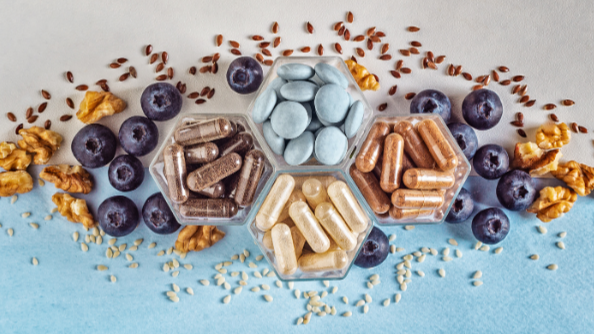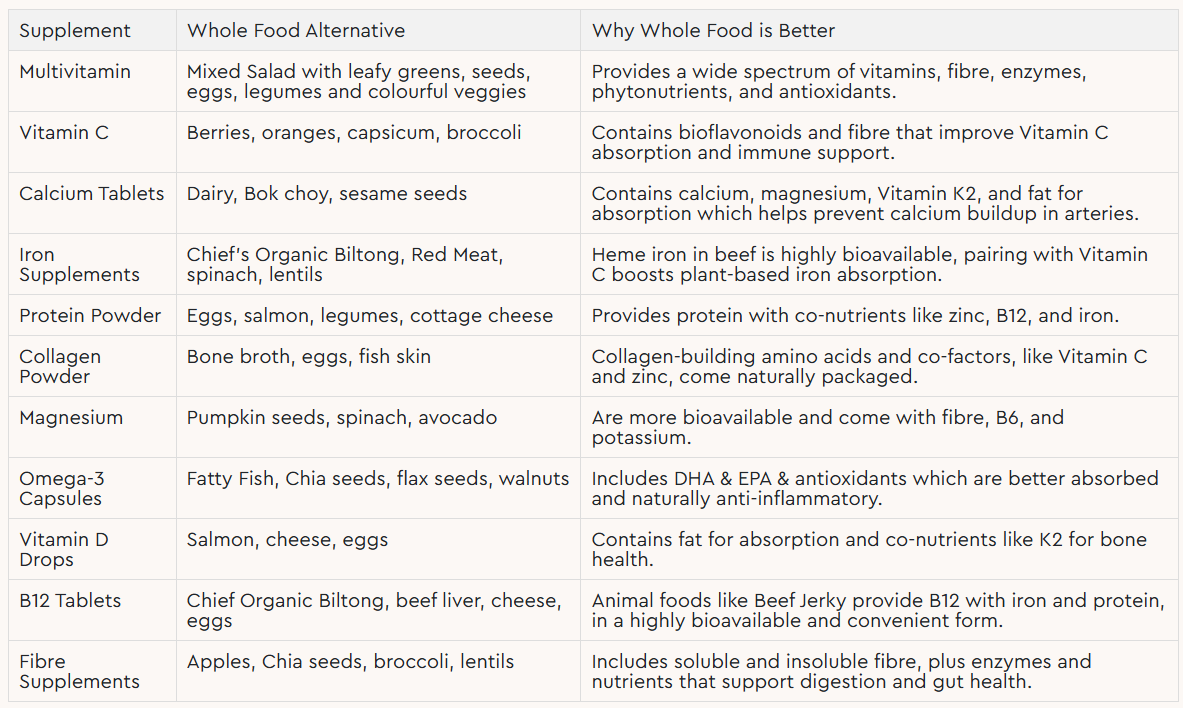Supplements Vs Whole Foods: Which Do You Absorb Better?
There’s always been a debate on ‘which is better?’ - whole foods or supplements? Especially when you’re aiming to hit certain nutrient goals.
And amongst all the information online it can be very difficult, and just overall confusing, to decipher.
So today, I thought I would dive into the world of ‘how your body absorbs nutrients and why whole foods are the better choice’.
Human Body
Our bodies are fundamentally like animals in nature. We’re programmed to recognise and process food in its most original form. This means the closer a nutrient is to its natural state, the more likely our bodies will effectively absorb and utilise it.
Nutrient Interaction
Whole foods do not contain nutrients in isolation. They have a variety of nutrients that work synergistically together. To give an example:
– Vitamin C in fruits helps your body absorb iron from plant sources.
– Prebiotics from foods like onion helps to feed your probiotics from foods like yogurt.
– Vitamin A is absorbed best when paired with healthy fats, such as pairing your roast veggies with olive oil.
Supplements on the other hand often focus on nutrients in isolation. Meaning they miss out on the very important enzymes, fibres, polyphenols and antioxidants' that whole foods provide.
Let’s look at whey protein isolate as an example.
Although it can be fantastic when you’re trying to reach a certain protein macro target, it can cause issues with digestion, muscle repair and absorption because it isn’t working synergistically with other nutrients.
What’s really in a supplement?
So often you can choose supplements that look healthy on the forefront, promising a variety of great benefits. But unfortunately, the reality is, so many supplements are filled with synthetic ingredients, artificial ingredients, fillers, sweeteners, or thickening agents.
You may be looking at this list and thinking, ‘well why are these really so bad?’
The dark side is that these ingredients can cause a toxic load, potentially counteracting any potential nutritional benefits.
Frequent or long-term intake of such ingredients can disrupt digestion and gut health and can contribute to inflammation or metabolic issues
Quality truly does matter – from source to supplement
The quality of the nutrients that go into supplements matters. Many supplements, such as over the counter, are mass produced. They are typically processed in ways that dramatically reduce their nutritional value.
Each step of manufacturing can diminish the bioavailability of nutrients. Which intern means your body cannot absorb or use the nutrient to its full capacity.
The Science Behind Whole Food Nutrition
Our bodies have evolved over time to extract nutrients from whole food sources. The complex interactions between different compounds in foods cannot be replicated in a laboratory:
• Enzymes
• Macronutrients
• Vitamins
• Phytonutrients
• Minerals
When you consume whole foods such as vegetables or fruits, you’re getting:
• Complete nutrient profiles
• Natural fibre
• Protective compounds
• Optimal nutrient interactions
Supplements, in contrast, often provide isolated nutrients that lack the comprehensive nutritional context of whole foods.
Practical Strategies for Nutrient Optimisation:
1. Focus on eating a diverse, whole-food diet
2. Choose minimally processed foods
3. Select supplements carefully, if needed
4. Understand that food provides more than just isolated nutrients
The idea is, always, whole foods first. You want to be eating an amazing diet first and then possibly you can be supplementing the gaps. While supplements can play a role in addressing specific nutritional deficiencies, they should never be viewed as a magic fix.
To make it super easy, and a blog that you can come back to for practical swaps, I’ve created a comparison table!
Listen to your body and what it needs, it’s an amazing, complex system.
References
Cava, E., Padua, E., Campaci, D., Bernardi, M., Fares, Caprio, M., & Lombardo, M. (2024). Investigating the Health Implications of Whey Protein Consumption: A Narrative Review of Risks, Adverse Effects, and Associated Health Issues. Healthcare, 12(2), 246–246. https://doi.org/10.3390/healthcare12020246
Chen, J., & Xia, P. (2024). Health effects of synthetic additives and the substitution potential of plant-based additives. Food Research International, 197, 115177. https://doi.org/10.1016/j.foodres.2024.115177
Melse-Boonstra, A. (2020). Bioavailability of Micronutrients From Nutrient-Dense Whole Foods: Zooming in on Dairy, Vegetables, and Fruits. Frontiers in Nutrition, 7(101). https://doi.org/10.3389/fnut.2020.00101
Pressman, P., Clemens, R. A., & Hayes, A. W. (2017). Bioavailability of micronutrients obtained from supplements and food. Toxicology Research and Application, 1, 239784731769636. https://doi.org/10.1177/2397847317696366
Townsend, J. R., Kirby, T. O., Sapp, P. A., Gonzalez, A. M., Marshall, T. D., & Esposito, R. (2023). Nutrient synergy: definition, evidence, and future directions. Frontiers in Nutrition, 10. https://doi.org/10.3389/fnut.2023.1279925







